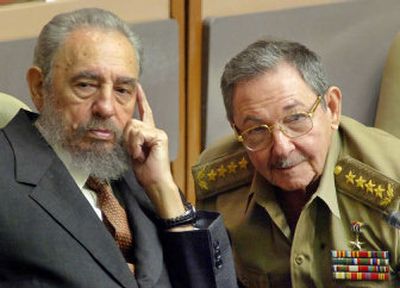U.S. wants communism in Cuba to die with Castro

WASHINGTON – Fidel Castro looks like the 79-year-old he is, and the Bush administration has big ideas for Cuba once he departs.
When that day comes, U.S. officials want to leave little to chance about the island nation’s political fate. They are prepared to go to some lengths to ensure that the communist system Castro created goes out with him.
It is official U.S. policy to “undermine” Cuba’s planned succession from Castro to his brother Raul, 74. Just how that process would unfold is not clear.
“We are looking to support a genuine transition to political freedom for the Cuban people,” said Caleb McCarry, the State Department official recently put in charge of transition matters for Cuba.
McCarry, a Republican who spent many years on Capitol Hill as an aide on Latin American issues, declined in an interview to address how the U.S. would carry out its policy on Cuban succession.
McCarry’s appointment on July 28, with Secretary of State Condoleezza Rice presiding, was one of the few at the department made in front of television cameras.
It gave Rice a platform for denouncing communist rule in Cuba, a stance perceived as a political winner for years among constituencies in South Florida and elsewhere in the U.S.
The appointment of a “transition coordinator” for Cuba arose in a 2004 report to President Bush by the Commission for Assistance to a Free Cuba, led by then-Secretary of State Colin Powell.
The report spells out steps to bring pressure on Castro and provide assistance if and when a democratically inclined leadership takes power.
Bush said upon the report’s release: “We believe the people of Cuba should be free from tyranny. We believe the future of Cuba is a future of freedom.”
The prospect of political transitions in other countries usually does not merit much attention. Cuba, however, is a special case.
A friendly government in Havana would mean an end to a security headache for Washington that has lasted 46 years.
According to the report last year, not long after Castro’s demise, 100,000 tons of food could be purchased quickly and shipped to Cuba.
U.S. charities would be encouraged to create and contribute to a foundation to aid a “Free Cuba.” American government officials would carry out a “hands-on needs assessment” as soon as possible. There are detailed plans for upgrading Cuba’s health and education system.
The 400-plus page report discusses ways to modernize Cuba’s aviation, railroad and maritime infrastructure. It envisions U.S. assistance in holding free and fair elections, fighting corruption and establishing independent trade unions.
Wayne Smith, a Cuba expert and former U.S. diplomat who long has advocated establishing normal U.S. relations with Cuba, said he is outraged by the administration’s plan. It is “blatant intervention in the internal affairs of another state,” Smith said.
“They talk about how we are going to oversee and facilitate the transition. Who gives us that right?” Smith asked.
The president of Cuba’s National Assembly, Ricardo Alarcon, likens the U.S. plan to an annexation or occupation of Cuba. He says the U.S. would regard Cuba “as a piece of land administered by the U.S.”
“The whole strategy,” Alarcon said in reference to the report, “is getting in forever.”
Castro, not surprisingly, debunks the notion that any change is needed in Cuba.
“We had our transition in 1959,” he has said, alluding to the year that he took power.
McCarry rejects charges that Washington’s assistance plan is a blueprint for U.S. control.
“The offer is not an imposition,” he said, asserting that none of the proposed programs would go into place without the consent of the transitional government on the island.